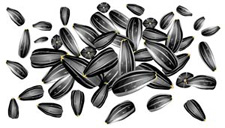Sunflower Seeds Nutrition

All About Sunflower Seeds Nutrition
For those of you who are getting into the nutritional craze that has swept the world over the past few decades, sunflower seeds nutrition might very well be worth a look. Sunflower seeds have long been the stereotypical snack of choice for major league baseball players (as well as the kids that want to be like them), but recently it has become popular with the rest of the population. Why? The benefits and advantages of sunflower seeds nutrition will be revealed and explained to you in this article.
Sunflower seeds come from the sunflower plant, which is a popular flower in the United States as well as the rest of the world. In fact, Kansas is even known as the “Sunflower State”. They are immediately recognizable to the average person, with their dark black centers and large, yellow to yellowish-orange petals. Seeds are harvested from these plants, which are frequently grown commercially to provide access to sunflower seeds nutrition.
The hallmark of the sunflower is the seed itself, which is highly prized by many for its healthy properties. Seeds are typically classified into two different types. The first are called black oil sunflower seeds, or oilseed sunflower crops. These seeds are the ones that are used to produce sunflower oil, and are identifiable by being solid black. The second type is called non-oilseed sunflower crops. These are identified by having striped husks, and do not have as much oil in them as the other kind. These are the ones people use for snacks. Russia, Ukraine, Argentina, China, and India are the top five sunflower seed producers in the world.
Sunflower seeds nutrition is all about the oil. Sunflower oil is polyunsaturated and is very low in cholesterol. It also has a plethora of other great benefits, so as pantothenic acid, phosphorus, manganese, and selenium. These are all important ingredients for the health and well-being of your body. Vitamin E is also very important, particularly for your skin and heart, and is found in abundance in sunflower seeds. Furthermore, sunflower seeds have tons of protein in them, which is how your body constructs and maintains muscle.
When comparing and contrasting plant oils for cooking, it is important to keep in mind oil from sunflower seeds. Sunflower oil is less expensive than olive oil and has as much –if not more- monounsaturated fat per volume. It is also much healthier than regular vegetable oil. Sunflower oil also has more iron, zinc, and folate, all ingredients that help with your circulatory system. Iron helps carry oxygen throughout the body; zinc maintains a strong immune system; and folate is essential in cleaning your blood and forming new body cells. All of these ingredients and more also contribute to lowering your risk of heart disease.
The one downside to sunflower seeds is that they contain trans fat. Trans fat is unsaturated fat that is chemically different, and poses a risk to your health. The good news is that trans fat in sunflower seeds is significantly lower than in other oils, and should not pose a risk. In other words, the benefits of consuming sunflower oil is far better than the drawback.
If you are serious about your nutrition, and want to be as healthy as possible, then it is worth looking into sunflower seeds. They make great snacks, not only for health reasons but for their salty taste. The oil from them also adds great flavor and a smooth taste to your cooking. As you have read, sunflower seeds nutrition is all about the ingredients and elements that make your body stronger and healthier and help protect against heart disease and other common maladies. So, the next time you see a baseball game, take note; munching on sunflower seeds is healthier than you think!